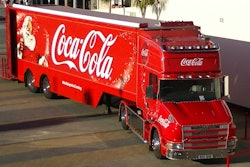Everyone says that the trucking companies are in control right now. Is that the case in your experience?
Byler: The carrier-shipper relationship is driven today more by a mutual respect and a willingness to participate than by carriers or shippers trying to lord over one another. Shippers have realized that, from bad experiences, they can't just pick up the phone and tell a carrier that they will find someone else. People in general are more interested in preserving relationships and developing a win-win situation, mainly because it's not that easy to find someone else any more.
Why is it so hard today to "find someone else?"
Byler: We're still having huge carrier attrition on an annual basis. The industry is slow to replace drivers and equipment, and there are a number of carriers that are closing their doors and shutting down their businesses, while at the same time demand is going up as more people turn to trucking to ship their products. Growth has been steady at about 7 percent a year, to the point that today there's not one thing that you can look at that at some point was not touched by a truck, from the asphalt you drive on to the food you eat.
What do you see as the main concern of carriers today?
Byler: Carriers have to be more selective right now because there are so many things that have all come together at the same time to work against them-the hours of service regulations, fuel costs, driver attrition, capacity-that have all made it a tough industry in which to make money right now.
Fuel could have been an issue, but as long as we can pass on the costs, it's more of an annoyance. About a year ago, our customers were apprehensive when they found out we'd have a fuel surcharge. It's a non-issue now. Our customers want to know what the surcharge is, but they're not apprehensive about it anymore.
Finding drivers is the big thing right now, and the industry is having a hard time solving that. At best, unless you're running a local operation where the driver can come home every night and have a normal life, it's really a mutant lifestyle.
What can the industry do to solve that?
Byler: The larger carriers are starting to develop tactics in such a way that they can move line hauls between terminals and these terminal drivers can have a normal life. Pre-determined time off is a big thing; when you know you have time off you can make plans with your family.
The only way to get to this is to create a line-haul schedule where the driver goes a few miles down the road, drops off a trailer and picks up a new one to come back. That way, he has a regular schedule and route. I think that until that situation is created, we'll all have a hard time getting drivers.
Right now, we've not done a very good job of taking care of our people where they can have a normal life, and, as a result, we're not exactly attracting the cream of the crop.
What affect will the new 2007 engine requirements have on the industry?
Byler: Truck manufacturers have always been on the cutting edge of technology and they know they have to be more environmentally friendly and fuel-efficient, but nothing's really going to change as long as we continue to rely on foreign oil and fossil fuels. These new tractors are really no different than they were 50 years ago. They're more comfortable for the drivers and there are more bells and whistles, but essentially not much has changed.
What is your outlook for the trucking industry?
Byler: This business seems to be in a constant state of change. It's a good time to own trucks because capacity is so tight, and as a result, people are willing to pay rates that I never thought were possible. If we go to a customer, he's not kicking and screaming at rates that are up around $1.50 per mile as he was three or four years ago. There's been an interesting evolution, but it's still a very tough industry for someone to make money in.
Where do you see the trucking industry going five to 10 years down the road?
Byler: You'll see a lot of shake out as people leave who did not realize that you need customer service to stay in business. You're going to see a lot of consolidation and acquisitions in the next five to 10 years. There will be less than 100 entities providing 90 percent of the services-trucking, logistics, intermodal and warehousing, as more companies take over total control of supply chains.
Also, I think you're going to see a large decline in logistics and transportation brokers as more and more companies develop a broader logistics posture on their own. Back in the early 1980s, there were so many owner/operators who had a reefer and hauled ICC-exempt products like produce that these brokers could call on at a moment's notice. Then with deregulation of the trucking industry, this large group of drivers started hauling more stuff. That's just not true any more. There are significantly less owner/operators now, and not a lot of people running as independents. Most are tied to the much larger carriers, and that makes getting that extra capacity that much more difficult.
Byler: The carrier-shipper relationship is driven today more by a mutual respect and a willingness to participate than by carriers or shippers trying to lord over one another. Shippers have realized that, from bad experiences, they can't just pick up the phone and tell a carrier that they will find someone else. People in general are more interested in preserving relationships and developing a win-win situation, mainly because it's not that easy to find someone else any more.
Why is it so hard today to "find someone else?"
Byler: We're still having huge carrier attrition on an annual basis. The industry is slow to replace drivers and equipment, and there are a number of carriers that are closing their doors and shutting down their businesses, while at the same time demand is going up as more people turn to trucking to ship their products. Growth has been steady at about 7 percent a year, to the point that today there's not one thing that you can look at that at some point was not touched by a truck, from the asphalt you drive on to the food you eat.
What do you see as the main concern of carriers today?
Byler: Carriers have to be more selective right now because there are so many things that have all come together at the same time to work against them-the hours of service regulations, fuel costs, driver attrition, capacity-that have all made it a tough industry in which to make money right now.
Fuel could have been an issue, but as long as we can pass on the costs, it's more of an annoyance. About a year ago, our customers were apprehensive when they found out we'd have a fuel surcharge. It's a non-issue now. Our customers want to know what the surcharge is, but they're not apprehensive about it anymore.
Finding drivers is the big thing right now, and the industry is having a hard time solving that. At best, unless you're running a local operation where the driver can come home every night and have a normal life, it's really a mutant lifestyle.
What can the industry do to solve that?
Byler: The larger carriers are starting to develop tactics in such a way that they can move line hauls between terminals and these terminal drivers can have a normal life. Pre-determined time off is a big thing; when you know you have time off you can make plans with your family.
The only way to get to this is to create a line-haul schedule where the driver goes a few miles down the road, drops off a trailer and picks up a new one to come back. That way, he has a regular schedule and route. I think that until that situation is created, we'll all have a hard time getting drivers.
Right now, we've not done a very good job of taking care of our people where they can have a normal life, and, as a result, we're not exactly attracting the cream of the crop.
What affect will the new 2007 engine requirements have on the industry?
Byler: Truck manufacturers have always been on the cutting edge of technology and they know they have to be more environmentally friendly and fuel-efficient, but nothing's really going to change as long as we continue to rely on foreign oil and fossil fuels. These new tractors are really no different than they were 50 years ago. They're more comfortable for the drivers and there are more bells and whistles, but essentially not much has changed.
What is your outlook for the trucking industry?
Byler: This business seems to be in a constant state of change. It's a good time to own trucks because capacity is so tight, and as a result, people are willing to pay rates that I never thought were possible. If we go to a customer, he's not kicking and screaming at rates that are up around $1.50 per mile as he was three or four years ago. There's been an interesting evolution, but it's still a very tough industry for someone to make money in.
Where do you see the trucking industry going five to 10 years down the road?
Byler: You'll see a lot of shake out as people leave who did not realize that you need customer service to stay in business. You're going to see a lot of consolidation and acquisitions in the next five to 10 years. There will be less than 100 entities providing 90 percent of the services-trucking, logistics, intermodal and warehousing, as more companies take over total control of supply chains.
Also, I think you're going to see a large decline in logistics and transportation brokers as more and more companies develop a broader logistics posture on their own. Back in the early 1980s, there were so many owner/operators who had a reefer and hauled ICC-exempt products like produce that these brokers could call on at a moment's notice. Then with deregulation of the trucking industry, this large group of drivers started hauling more stuff. That's just not true any more. There are significantly less owner/operators now, and not a lot of people running as independents. Most are tied to the much larger carriers, and that makes getting that extra capacity that much more difficult.


















